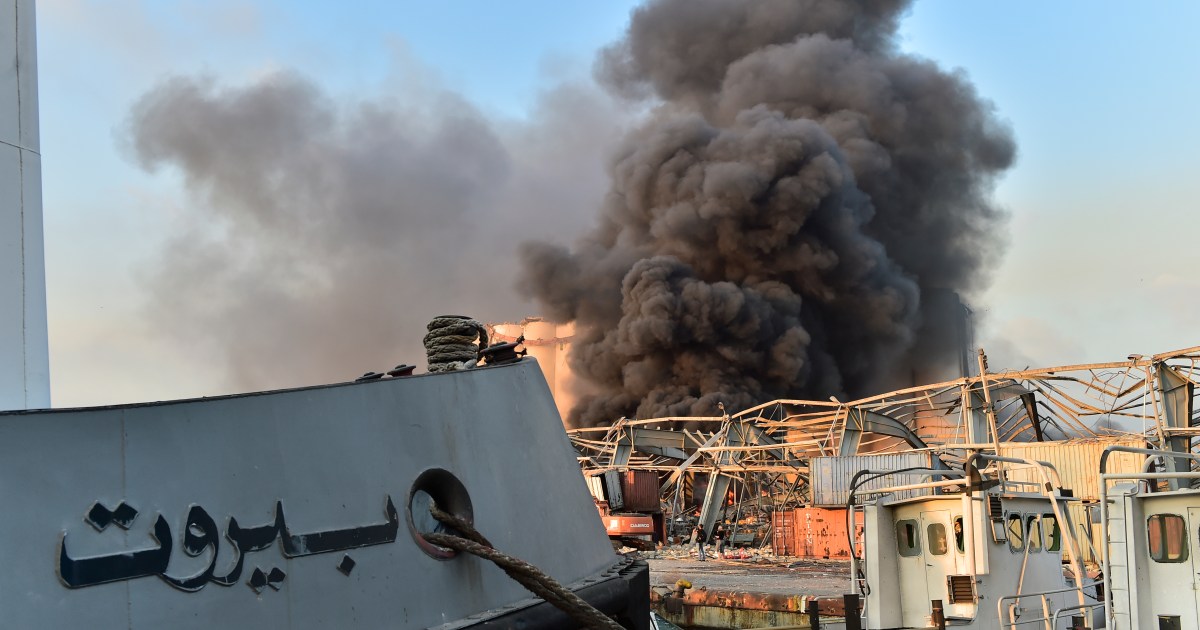A great disaster occurred in Lebanon as a result of the huge explosion that occurred at the Beirut Port on Tuesday, killing more than 100 people and wounding more than 4,000.
It is expected that the accident resulted from an explosion in a warehouse containing hundreds of tons of ammonium nitrate, so what do we know about this explosion so far?
what happened?
- A preliminary explosion took place at Beirut Port around six o'clock yesterday evening, which led to a fire, and then a massive explosion followed, destroying the facade of the port and the buildings surrounding it.
- Seismologists measured the pressure of the blast, which uprooted windows at Beirut International Airport nine kilometers away, the equivalent of a 3.3-magnitude earthquake.
- The video footage showed a very large fireball escalating sharply over large grain storage silos, then a cloud ascending to the sky, followed by a major wave that crossed the entire city.
Why was the explosion so big?
- Lebanese Prime Minister Hassan Diab announced that 2750 tons of ammonium nitrate was stored six years ago in a "dangerous" warehouse.
- Ammonium nitrate is a white, odorless salt that is used mainly for many nitrogen fertilizers in the form of granules, and is one of the fertilizer components called amontres, which farmers buy in large bags or by weight. They are non-flammable products, but they are oxidizers, that is, they allow the burning of another burning substance.
- Ammonium nitrate was the source of many tragedies - accidental or criminal - in the world, including a factory explosion in the French city of Toulouse in 2001, which killed 30 people.
- A security source confirmed that the materials in the warehouse had been confiscated for years from a ship in the Beirut port where a malfunction occurred, and it was placed in "Amber No. 12 in the port," noting that it had not been "followed up as required."
Was the explosion deliberate?
- According to Lebanese officials, there is no indication that the explosion was intended.
- For his part, US President Donald Trump announced yesterday that the two powerful explosions that shook the Lebanese capital, Beirut, appeared to be a "terrible attack," noting that US military experts had informed him that it was a bomb.
- But when asked about the president's remarks, the Pentagon spokesman said, "We have nothing for you" and "You will have to contact the White House to clarify."
- The Lebanese government considered the conditions in the port that led to the explosion "unacceptable," and pledged accountability.
How many victims?
- The Lebanese Red Cross announced today that the blast killed more than 100 people and injured more than 4,000 others, indicating that its teams are still conducting search and rescue operations in the areas surrounding the blast site.
- Injuries were recorded in all parts of the city, as buildings blew in several areas, and fell on the residents.
- Beirut Governor Marwan Abboud said today, "I think that there are between 250 and 300 thousand people who have gone without homes, their homes have become uninhabitable," noting that he estimates the cost of the damage at between 3 and 5 billion dollars, pending the issuance of the final reports by engineers and experts.
what happened after that?
- The Supreme Council of Defense in Lebanon declared Beirut a "disaster hit" following an emergency meeting held hours after the explosion, and the Prime Minister appealed to the friendly countries of Lebanon to stand by his country and send aid.
- Lebanese President Michel Aoun decided to "release the extraordinary credit" from the budget, amounting to 100 billion Lebanese pounds, and to allocate to exceptional and emergency conditions, in a country facing mainly a rapid economic collapse and the spread of an epidemic Covid-19.
- Urgent medical assistance and field hospitals began arriving in Lebanon today, while the countries of the world, including the United States, France, Qatar and Iran, rushed to offer their aid and offer their condolences after the explosion.

